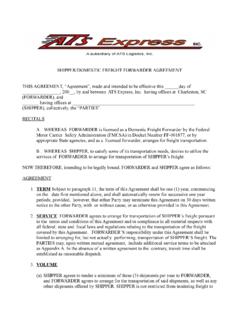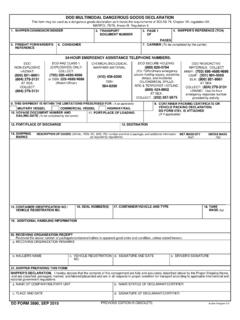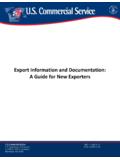Transcription of CH 2- Air Cargo Trends - Air Cargo Task FINAL
1 Florida Air Cargo System Plan Chapter 2 Wilbur Smith Associates 2-1 Chapter 2 Air Cargo Trends and Overview INTRODUCTION This chapter provides an overview of the air Cargo industry, air Cargo carriers and airports. This chapter also provides a brief overview of the services, carriers and airports utilized in today s air Cargo industry. Air Cargo Trends specifically related to airports in the State of Florida are also presented. The following specific topics are discussed: Air Cargo Industry Overview Air Cargo Trends Florida Air Cargo Trends AIR Cargo INDUSTRY OVERVIEW Air Cargo Carriers Air Cargo services are provided by a segmented group of air carriers that provide differing services based upon wide ranging customer demands.
2 The following four basic types of carriers provide these services: Integrated express operators All- Cargo carriers Commercial service passenger airlines Ad-hoc Cargo charter carriers Integrated express operators (FedEx, UPS, DHL) operate a fleet of scheduled aircraft, trucks, and couriers offering door-to-door delivery service. These carriers operate extensive hub-and-spoke networks providing expansive geographic coverage. In 2003, integrated express carriers accounted for 61 percent of the domestic air Cargo market, yet held only 12 percent of the international market (projected to increase to 31 percent by 2019).1 All- Cargo carriers (Atlas Air Cargo , Gemini) generally operate scheduled widebody aircraft from one major airport to another, such as Chicago to Tokyo and are highly reliant on the air freight forwarding industry.
3 Approximately 10 to 15 percent of world air Cargo traffic is moved by all- Cargo carriers, primarily on long-haul international or trans-continental routes. Due to their airport-to-airport service structure, all- Cargo carriers are typically concentrated in large, high volume market airports; geographic coverage is limited. In 2003, scheduled all- Cargo operators accounted for 19 percent of the domestic Commercial service passenger airlines (United, Delta, US Airways) are scheduled passenger airline operators. Space in the bellies of these aircraft is generally available 1 Boeing World Air Cargo Forecast, 2004/2005.
4 2 Ibid. Florida Air Cargo System Plan Chapter 2 Wilbur Smith Associates 2-2 to move Cargo airport-to-airport. Commercial air carriers account for the majority of international air Cargo lift, yet provide limited domestic lift. It is estimated that 50 percent of international air Cargo traffic is moved in the bellies of passenger aircraft. However, within the domestic market, commercial carriers account for only 15 to 20 percent of the domestic air Cargo a market dominated by the integrated express carriers. The air Cargo market share of commercial passengers carriers, particularly on domestic routes, has declined significantly due to security measures and restrictions brought about by the September 11 terrorist attacks.
5 Pre-September 11, it was estimated that commercial passenger carriers accounted for 25 percent of the domestic air Cargo market. Ad-hoc Cargo charter carriers (Grand Aire, Volga-Dnepr) are unscheduled air charter operators who move goods from airport-to-airport. The market share of these operators is minimal, difficult to gauge and often lumped together with the all- Cargo carriers. Sporadic and unscheduled operations make tracking tonnage difficult; best estimates put ad-hoc Cargo operator market share at 5 percent domestically and 2 to 3 percent internationally. Air Cargo Services The four types of air Cargo carriers discussed in the previous section provide the following three primary types of air Cargo service options: Integrated express service Freight forwarding Airport-to-airport Integrated express carriers move the customer s material door-to-door, providing shipment pickup, transport via air or truck, and delivery.
6 Integrated express operators include FedEx, UPS, newly merged DHL/Airborne Express, and to a certain extent Postal Service (USPS). Express companies provide next day, document, and small package (two to 70 pounds) services to the customers they serve. Increasingly, however, express operators are transporting heavy freight, identified as more than 70 pounds. Burlington Air Express (BAX) is an integrator that specializes as an express heavy freight carrier. In addition to overnight service, express carriers now offer deferred service or second-day and third-day time-definite service, changing the dynamics of the air Cargo industry significantly.
7 Deferred service is predicted to surpass the overnight (express) delivery of letters, documents, and packages. In addition, the wider use of facsimiles and e-mail has cut into the overnight letter and document delivery market, and is anticipated to continue doing so. The lower cost deferred delivery does not mean uncertain delivery; most is time-definite, meaning guaranteed delivery at a specific time on a certain date. This service is increasingly used to move freight over 70 pounds. Integrated express carriers operate using a hub-and-spoke system similar to the passenger airline system. The hub is the backbone to the integrated express carrier since it provides connections to each market in the integrator s system.
8 Each day of operation, flights from around the arrive at the hub where packages are offloaded, sorted in the hub to the appropriate destination market, and then reloaded onto the aircraft. Florida Air Cargo System Plan Chapter 2 Wilbur Smith Associates 2-3 Traditional integrated express service focuses on the small-volume, infrequent shipper or higher volume shippers moving product to multiple destinations. This market can be termed the retail air Cargo market; this market includes individual, private and business-to-consumer (B-to-C) shippers. However, integrated express carriers are well established in the wholesale market, catering to larger freight movements demanded by manufacturing and distribution operations.
9 This traditional freight forwarder and all- Cargo -carrier market includes corporate, block-space (guaranteed capacity shippers) and business-to-business (B-to-B) customers. Freight forwarding companies act as brokers between the shipper and the carrier (all- Cargo , commercial passenger or ad-hoc charter). The forwarder handles wide-ranging types and sizes of freight, from small packages to be consolidated into container loads, to oversized, one-time freight movements. These loads are then tendered to an air Cargo carrier or commercial carrier to deliver to the forwarder s agent or subsidiary at another airport. Serving a dual role, the air freight forwarder is, to the shipper , an indirect carrier.
10 It s classified as such because the forwarder receives freight from the shipper under the forwarders own tariff, usually consolidating it into larger units that are then tendered to the airlines. From the perspective of the all- Cargo carriers ( Polar Air Cargo ) and commercial carriers ( United Airlines), the freight forwarder is the shipper . In addition to using third-party service providers to move freight from airport to airport (commercial carriers and all- Cargo airlines), freight forwarders also often rely on third-party less-than-truck load (LTL) motor carriers to move consignment to and from the airport.









